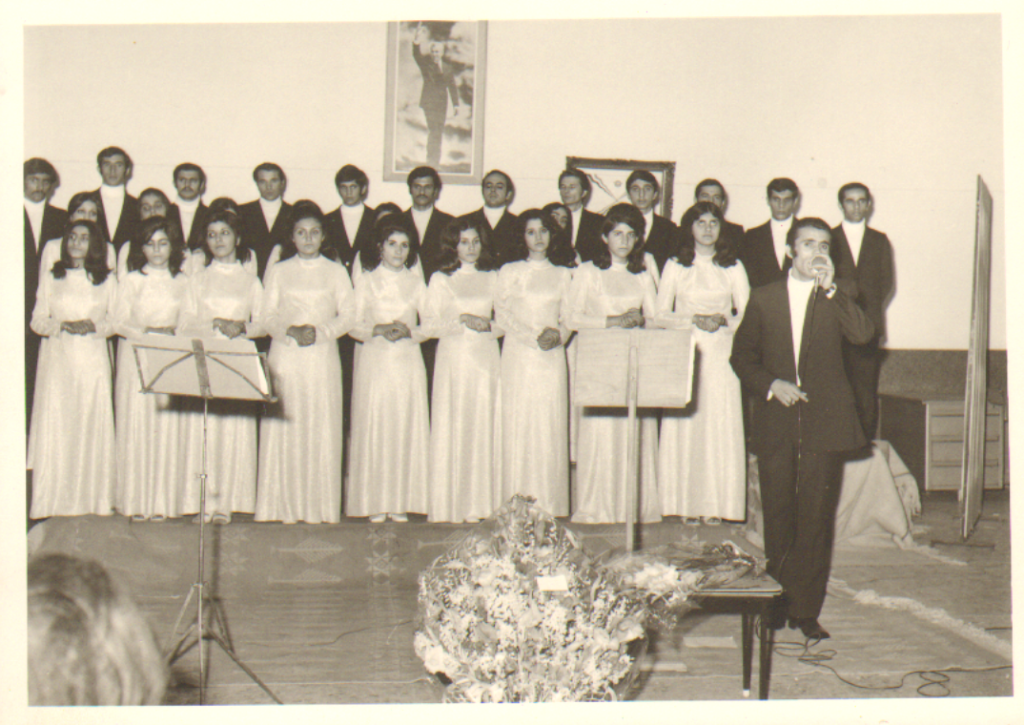The history of choirs can be traced to millennia before Christ. It is known that in ancient Assyria there were choirs accompanying musicians in processions. After converting to Christianity many kind of musical presentations disappeared.
The first to bring music into the Assyrian Churches was Mor Ephrem (306-373), who had also organized mixed Church choirs and composed hymns and prayers in opposition to the heretics.

Mor Afrem Choir of Dr. A. Lahdo Christmas concert 2008 – Wiesbaden
Due to permanent persecution, massacre and therefore rare documents we don’t have today a clear timeline about the development of musical activities till the 20th century. The focus of this short article are known secular choirs in modern times.
First secular choirs outside the church can be found in Iran. A first choir containing around 15 members was founded at the beginning of the 1930s by Dr. Malcolm Amrikhas and Leleh Dooman. A picture of this group exists from the 14th July 1939 with the title “Assyrian Singing group of Urmiya”.
Most choirs established in Iran were part of the accomplishment of known masters in Assyrian music. Contrary to the policies of other countries, Assyrians living in Iran were allowed as early as 1943 to have a weekly program on the national radio. During this period fall numerous activities of the well-known composer and poet William Daniel (1903-1988). Daniel returned from Europe back to Iran after his music study in 1937 and wrote songs that were broadcasted weekly on the radio. Daniel organized a choir, numerous plays and concerts, and taught classes in the Syriac language and literature.
Another Maestro is Nebu Issabey (1936-2014) who studied Music in Europe and established his known Nineveh Choir after his return in 1958. This choir included up to 100 members who performed in several Iranian cities. Beside classical European music (like Händel or Bach) Issabey’s own compositions were also performed. In 1966 Iranian Fine Arts Council chose the Nineveh Choir as the leading Choral Group in the country and it was invited to perform in front of the Shah in the Imperial Palace. In 1973 Nebu moved to Chicago where he reestablished the Nineveh Choir in the same year with both old and new members. They gave many concerts in various areas of Chicago and California.
In the same time Rabi Paulus Khofri (1923-2000) entered the stage of Assyrian Music.
He was born in Baghdad and his family moved first to Kermanshah and then to Abadan. The “Sawra” (Hope) choir in Abadan was founded in 1959 by Paulus and his brother Asarhaddon. Khofri completed his music studies in 1964 at a Music school in New York and amended it with a second study at Yale University and a degree at the Royal Music Academy of England.

One further music personality is Alexander (Shoora) Michailian (born 1930 in Kharkov/Ukraine). He was a student of the late Rabi William Daniel and whilst in Abadan Shoora established the first Assyrian band (The Eagle Band) with Paulus Khofri as band member. Further to this, Shoora established the first Nabouram Assyrian National Choir in Abadan’s Assyrian Shushan Elementary School in 1966. Perhaps the focal point in the career of this Assyrian musician and educator came when Michailian received the Royal Award from the Shah of Iran for his special composition in the form of a choral work, for the celebration of the 2500th anniversary of the Persian Empire, in 1971.
Another highlight of maestro Shoora’s musical life after his emigration to the USA was the re-establishment of the choral and instrumental group of approximately fifty members,
Nabouram Assyrian National Choir and Orchestra of the Assyrian American Civic Club of Turlock, in January 1983. Before leaving for Australia in 1998 he released several albums and conducted many concerts with this choir.
Assyrian Music in Iran of the early 1970s was moulded by Vania David as musician and composer and founder of the “Assyrian Folk Choir” with up to 75 members. Many known songs were performed at that time by artists and choir members like Robert Ibrahimi, Simon Issa, Clara Nassara (Shino), George Sarvanus and Gewargis Manphy. More than 25 concerts were arranged and conducted by Vania in many Iranian cities. The poet Misha Ashurian wrote the lyrics for the most songs of that period.
Among east-Assyrian choir activities the accomplishments of Mesopotamian Night (organized by Assyrian Aid Society of America) should be mentioned. As I recognized Mesopotamia choir and symphony orchestra conducted by Maestro John Kendall Bailey was in almost all events since 2009 part of the program.
For west-Assyrians the work of Dr. Abrohom Lahdo as founder and conductor of the renowned Mor Afrem choir should be commended. Abrohom Lahdo founded his choir in 1995 in the city of Wiesbaden (Germany). This choir is comprised of over 45 members, and has performed 28 concerts across Europe. Many new talented artists started their career as singer in this choir (i.e. Linda Hadiko, Fadi Bahno or Kamil Hanna). The adults’ choir of Abrohom Lahdo also worked with children. Around 70 children performed at two events on stage. The Mor Afrem choir released six albums with live and professional recordings of church hymns and folk songs.
The founding of the Syriac Music Choir by Issa Habil in 2003 in Stockholm is a further step in the performance of organized choirs. Since its establishment this choir has had more than 30 performances with church hymns and folk songs. The conductor use to involve good musicians (i.e. Mousa Elias or Yakob Danho) in his concerts. Besides the numerous concerts
in Sweden this choir was also invited to the USA (New Jersey) in 2009. In 2015 this choir accompanied the Syriac-orthodox Patriarch to the Vatican and performed in front of Pope Francis. The Syriac Music Choir released 3 church albums and one album containing known folk songs.
Another choir was established by the musician Elias Musake in cooperation of the local Assyrian association in the Dutch city of Enschede around the year 2000. In 2004 an album containing church hymns was released. Beside several performances in the Netherlands, this Mor Afrem choir gave an outstanding concert in the British Museum in London on the 18th of February 2009. In that event the singers Habib Mousa, Nagham Edwar Mousa and George Homeh performed on stage along with the choir.
 Article by: Abboud Zeitoune is author of the books (www.musicpearls.net) Music Pearls of Bethnahrin (2007) and Modern Assyrian Music (2015) Abboud Zeitoune is the first one who took a step to archive, document and preserve modern Assyrian Music. Through his books (Music pearls of Bethnahrin in 2007 and Modern Assyrian Music in 2015), a 21-part TV documentary (on SuroyoTV) and many lectures he laid the groundwork for further comprehensive studies and handing over to future generations.
Article by: Abboud Zeitoune is author of the books (www.musicpearls.net) Music Pearls of Bethnahrin (2007) and Modern Assyrian Music (2015) Abboud Zeitoune is the first one who took a step to archive, document and preserve modern Assyrian Music. Through his books (Music pearls of Bethnahrin in 2007 and Modern Assyrian Music in 2015), a 21-part TV documentary (on SuroyoTV) and many lectures he laid the groundwork for further comprehensive studies and handing over to future generations.
